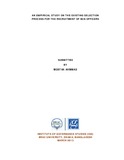| dc.contributor.advisor | Islam, Md. Zohurul | |
| dc.contributor.author | Ahmmad, Mostak | |
| dc.date.accessioned | 2014-08-28T08:49:01Z | |
| dc.date.available | 2014-08-28T08:49:01Z | |
| dc.date.copyright | 2013 | |
| dc.date.issued | 2013-03 | |
| dc.identifier.other | ID 12172002 | |
| dc.identifier.uri | http://hdl.handle.net/10361/3493 | |
| dc.description | This thesis is submitted in partial fulfillment of the requirements for the degree of Masters of Arts in Governance and Development, 2013. | en_US |
| dc.description | Cataloged from PDF version of thesis. | |
| dc.description | Includes bibliographical references (page 54 - 55). | |
| dc.description.abstract | The present study deals with the existing officer selection process for direct
recruitment to civil service, especially in the cadre service (BCS). It includes, BCS
examination system, distribution of marks for written and viva, exam curriculum,
barriers to the merit, duration of the selection procedure, eligibility criteria, etc. This
study has made a number of findings to examine the above-mentioned areas of BCS
officer selection process. Almost all the respondents of this study are dissatisfied with
the existing selection process for the recruitment of officers in BCS. They think that
the existing figure of quota (55% of the posts) should be reduced drastically, and that
at least 75% posts should be distributed purely on the basis of merit. The existing
BCS officer selection process has been considered as a lengthy process. So, most of
the respondents have suggested maximum one year for the completion of the whole
selection process. Almost all the respondents think that the preliminary examination
for making a short list of candidates should continue. A significant number of
respondents think that the curriculum for the written examination should be modified.
In this study, the major portion of respondents suggested that 800-1000 marks for
BCS written examination does not show the significant difference with the existing
pattern of marks. On the other hand, most of the respondents proposed maximum 100
marks for BCS viva-voce in place of the existing 200 marks. A significant number of
respondents think that political interference and corruption have also an important
role on the existing officer selection process. Most of the respondents are satisfied
with the existing eligibility criteria required for the BCS applicants. They don't
support the idea of special consideration on the age limit; and they recommend similar
age limit for all applicants. 32 years of age limit has been suggested by the majority of
the respondents. On the basis of the above-mentioned findings, this study has made a
number of recommendations to get rid of this situation, thus create equality in job
opportunity and build a merit-based civil service for ensuring better governance in
Bangladesh. | en_US |
| dc.description.statementofresponsibility | Islam, Md. Zohurul | |
| dc.format.extent | 75 pages | |
| dc.language.iso | en | en_US |
| dc.publisher | BRAC University | en_US |
| dc.rights | BRAC University thesis reports are protected by copyright. They may be viewed from this source for any purpose, but reproduction or distribution in any format is prohibited without written permission. | |
| dc.subject | Governance and development | en_US |
| dc.subject | Civil service | en_US |
| dc.subject | Recruitment and selection | en_US |
| dc.title | An empirical study on the existing selection process for the recruitment of BCS officers | en_US |
| dc.type | Thesis | en_US |
| dc.contributor.department | Institute of Governance Studies, BRAC University | |
| dc.description.degree | M. Governance and Development | |

